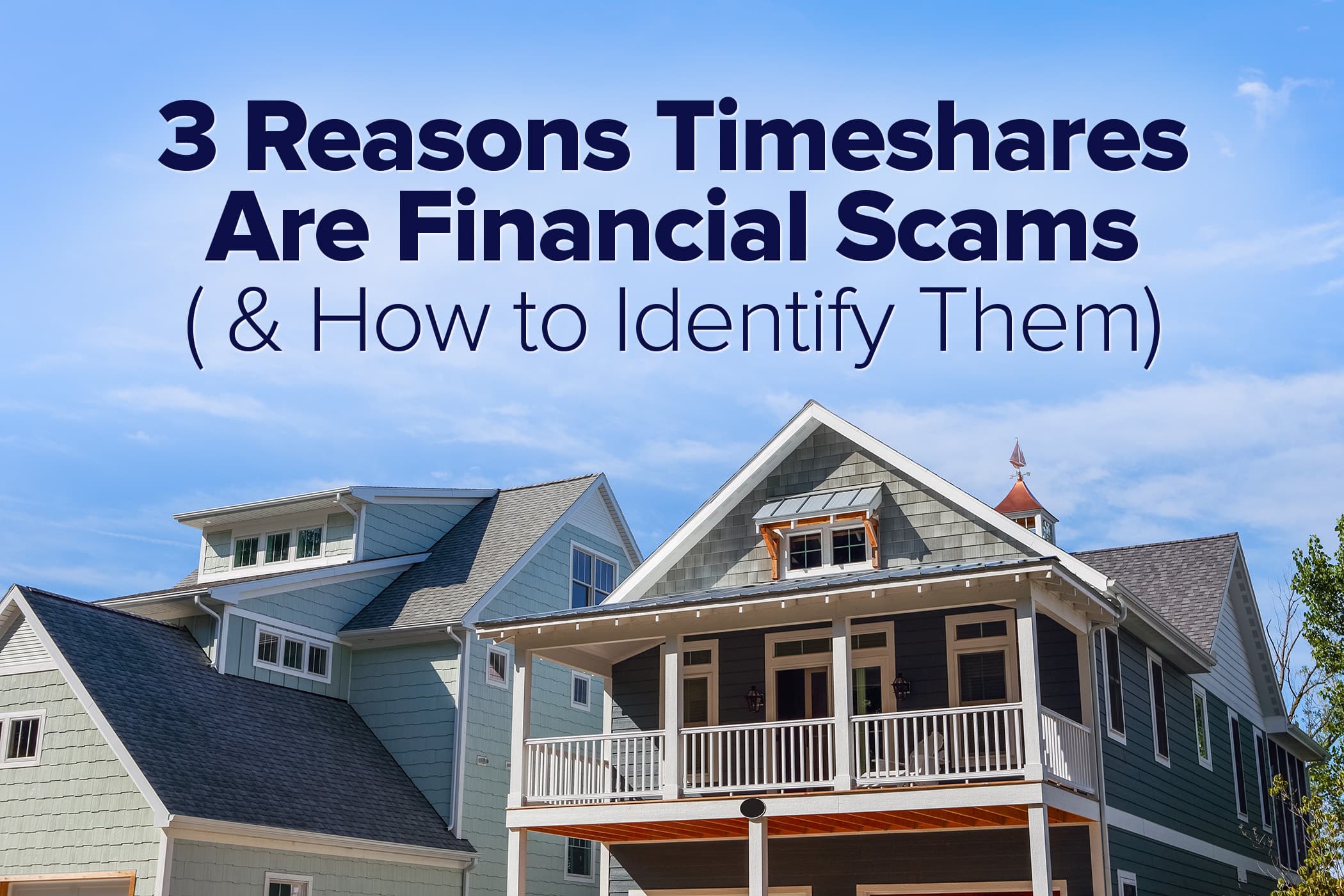Table of Contents
Why Are Timeshares So Hard to Get Out of?
If you own a timeshare, you already know the shine wears off faster than you’d like. Maybe it happened when you opened a bill that seemed higher than last year’s, or when you tried to book your week and found every date you wanted was taken. Many owners reach a point where they start asking why timeshares are so hard to get out of. The truth is, there’s more working against you than you might expect: tight restrictions buried in the paperwork, companies that make the exit process slow and frustrating, and a resale market where interested buyers are hard to find. The more you understand those hurdles, the better prepared you’ll be to find a real solution. In the sections ahead, we’ll break down exactly what makes exiting so tricky and the proven ways you can finally leave yours behind.
How Do Timeshares Work?
A timeshare is a shared vacation property that multiple owners use at different times throughout the year. Some timeshares give you a deed, which means you own a slice of the property. Others are right-to-use, where you’re just buying time. Sales reps will paint you a picture of endless vacation weeks, maybe even swapping for beach getaways or mountain cabins. What’s rarely mentioned are the yearly charges that tend to grow and the scramble to book before the prime weeks disappear. What you don’t hear as much about are the fees that seem to creep up every year. Those “flexible” rules can turn rigid the moment you try to make a change. If you’re unfamiliar with the basics, you can learn more about how timeshares work before deciding whether one fits your travel plans or budget.
The Main Reasons Timeshares Are So Difficult to Exit

How hard is it to get out of a timeshare? Getting out of a timeshare isn’t as simple as handing back the keys. Owners encounter multiple roadblocks, each designed to keep them locked in. Some challenges come from the terms you agreed to, while others are tied to the market itself. Below, we’ll look at the most common barriers and why they make the process so frustrating.
Long-Term Ownership Clauses
Some timeshares are sold with ownership terms that can stretch for decades. Others don’t expire at all, making the ownership feel never-ending unless you take proactive steps to exit. These clauses are often buried in paperwork and rarely discussed in detail during the sales process. Once you’ve signed, you may find you’re committed far longer than you expected, making the path to exit much more drawn-out.
Limited and Strict Cancellation Windows
Many new owners ask, “Is it hard to get out of a timeshare?” When a timeshare is purchased, there’s usually a short period where you can cancel without penalty. In many states, that window is only a few days. Miss it, and your options shrink fast. Sales teams know this and will often encourage you to “give it a try” until the deadline passes. Once that period closes, the process to exit becomes slower, more expensive, and more complicated to untangle.
Escalating Annual Fees
Maintenance fees have a habit of creeping up. One year, it’s a small bump, the next it’s a jump you didn’t see coming. Then there are the “special assessments” for things like new furniture or repairs you’ll never personally use. Over time, that bill can grow from an irritation into a financial burden. For some owners, the rising costs are what finally push them to look for a way out, but by then, leaving is rarely straightforward.
A Weak Resale Market
Many owners only realize how hard it is to get out of a timeshare when they try to sell and find no buyers. Selling a timeshare can be frustrating. You put up a listing, and weeks pass without even a phone call. A couple of months later, someone might reach out, only to offer less than the cost of dinner for two at a fancy restaurant. Meanwhile, hundreds of other owners are dumping similar weeks onto the same sites, hoping someone bites. With so many listings competing for attention, finding a buyer can feel impossible.
Resistance from Timeshare Companies
And if you think the company will make it easier, think again. Some companies may take weeks to respond or shift you between departments, which can cause frustration and delays.. Some push “special offers” to keep you locked in a little longer, while others insist there’s simply no way to end your timeshare ownership. Every delay works in their favor, because the longer the process drags out, the more money they collect in fees.
The Financial Impact of Timeshares

The longer you stay locked in, the more the financial strain builds. What starts as a single yearly bill often grows into multiple charges that seem to arrive one after another. Rising maintenance costs, unexpected assessments, and the inability to recoup what you’ve spent all pile on. This often makes the push to get out even stronger.
Ongoing Maintenance Fees
Those yearly maintenance bills rarely stay put. Some years the increase is small, other years it’s a spike big enough to make you question keeping the property at all. Then come the extra charges: special assessments for repairs, upgrades, or “resort improvements.” Over the years, these amounts can turn into a severe strain, eating into vacation budgets and household finances alike.
Depreciating Timeshare Values
If the fees don’t convince you to leave, the value drop might. The moment you buy, the resale price usually drops, and it rarely climbs back up. Many owners are shocked to discover that their week is worth far less than they paid, often only a fraction of the original cost. Unlike a traditional property, there’s no genuine appreciation, so the longer you hold it, the less you can expect to get back. That drop in value is one of the biggest reasons a sale often fails to solve the problem.
Timeshare Exit Myths

Why is it hard to get out of a timeshare? A lot of misinformation floats around when it comes to getting out of this property. Some of it comes from other owners, some from online forums, and some from companies promising quick fixes. Believing the wrong advice can cost you time, money, and even damage your credit.
While some owners search for quick fixes online, it’s important to avoid risky advice that could harm your finances. Working with a trusted service is often the safest path forward
You Can Stop Paying
Skipping payments might sound like a way to force an exit, but it usually creates bigger problems. Missed bills can lead to collection calls, damage to your credit score, and the possibility of legal action. If you’re looking for a way out, this approach often leaves you in a worse position than when you started. Learn more about what happens if I stop paying my timeshare maintenance fees before taking that step.
Selling is Easy
Many owners assume they can sell their property quickly and recover most of what they spent. In reality, the market is flooded with listings, and demand is low. Even if you find a buyer, the offer is usually far less than you expect. Believing in a simple, profitable sale often leads to disappointment and more wasted time.
All Exit Services Are the Same
Not all companies that offer timeshare exits work the same way. Some have proven track records and transparent processes, while others make big promises without delivering results. The wrong choice can cost thousands and leave you no closer to leaving. Taking the time to research and verify a company’s history can protect you from costly setbacks.
How to Get Out of a Timeshare

While getting out of a timeshare isn’t easy, there are legitimate paths that can work if handled the right way. Each option has its requirements and timelines, so knowing what’s available can save you from wasted effort and costly mistakes.
Take Advantage of the Rescission Period
If you’ve just bought your timeshare, check your state’s laws for the cancellation window. In many cases, you have only a few days to walk away with no penalty. Send your notice in writing, keep proof it was delivered, and follow the exact steps outlined in your purchase documents. Acting quickly is the best way to avoid a long, drawn-out exit process.
Negotiate a Deed-Back
In some cases, a resort will take your timeshare back through a deed-back program. They don’t usually promote it, and it’s not open to everyone. You may have to be fully paid up on fees or meet other conditions before they’ll even consider it. If you find out your resort offers this path, ask for the terms in writing and review them closely. When it’s available, it can be one of the cleaner ways to exit, but that depends entirely on whether your resort is willing.
Explore the Secondary Market
Selling on the secondary market is another route, though rarely a quick one. Prices on the resale market are usually a fraction of what you paid, and some listings never get a single offer. If you decide to try, stick with trusted timeshare resale companies to avoid scams. Even then, success often depends on the location, the season tied to your ownership, and how much competition there is from other sellers.
Work with a Reputable Exit Company
A legitimate timeshare exit company like Wesley Financial Group can guide you through the process and handle the steps that are difficult to manage on your own. The good ones are transparent about their track record, explain how they’ll work on your case, and set realistic timelines. Avoid any service that promises an overnight fix or refuses to share details in writing. Choosing the right company can mean the difference between a smooth exit and years of continued frustration.
How to Protect Yourself Before Buying a Timeshare

The best way to avoid the stress of an unwanted timeshare is to be cautious before you sign anything. Understanding precisely what you’re committing to can save you from years of financial strain and frustration later.
Understand the Full Commitment
Before you agree to buy, look closely at the long-term costs, the scheduling rules, and any obligations that might continue for decades. Factor in rising maintenance fees and the possibility of special assessments. Ask yourself if you’ll still want, or be able, to use the property years from now. Many owners regret not taking the time to weigh those realities before buying.
Ask the Right Questions Upfront
Before you commit, make sure you have clear answers about how the schedule works, what happens if you can’t travel during your assigned week, and how fees are calculated. Ask if the resort has a buy-back or deed-back option, and find out exactly how often rates have increased in recent years. The more information you have in writing, the less likely you are to face surprises later. Document everything you’re told so you have proof if promises aren’t kept.
Reach Out to Wesley Financial Group

If you’re stuck in a timeshare and ready to move on, Wesley Financial Group* can help. Our team has worked with thousands of owners to end their obligations successfully. We focus on clear communication, proven strategies, and a process designed to protect your best interests. Every situation is unique, which is why we take the time to understand your needs and create a plan that works for you. Reach out today and take the first step toward leaving your timeshare behind for good.

Over 50,000 families helped!
Find out if you can cancel your timeshare. Schedule a FREE consultation with timeshare cancellation experts now.
Get Rid of Your Timeshare
Schedule a FREE Consultation with one of our timeshare cancellation experts who have saved families over $635 million.










